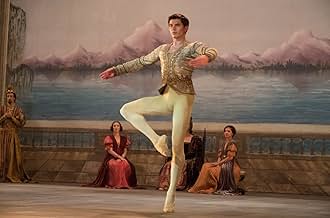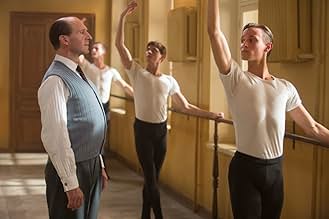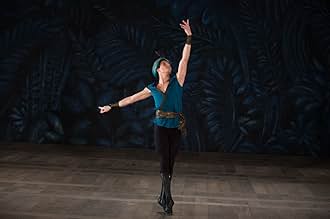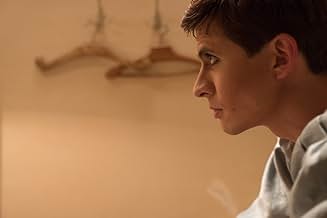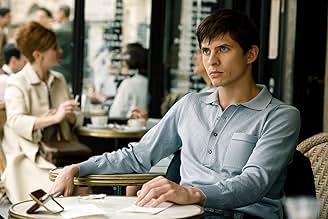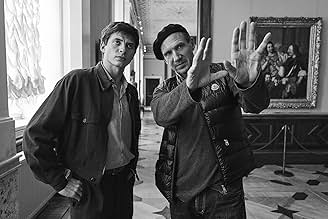AVALIAÇÃO DA IMDb
6,6/10
7,3 mil
SUA AVALIAÇÃO
A historia de como o bailarin Rudolf Nureyev escolho Occidente antes do que a União Soviética.A historia de como o bailarin Rudolf Nureyev escolho Occidente antes do que a União Soviética.A historia de como o bailarin Rudolf Nureyev escolho Occidente antes do que a União Soviética.
- Direção
- Roteiristas
- Artistas
- Prêmios
- 1 vitória e 4 indicações no total
- Direção
- Roteiristas
- Elenco e equipe completos
- Produção, bilheteria e muito mais no IMDbPro
Avaliações em destaque
Based on the life of Rudolf Nureyev (portrayed by Oleg Ivenko): in different time segments, the life of the ballet great is depicted during his childhood in rural Eastern Russia; his late teen years training in Leningrad (now St. Petersburg); and the Kirov Ballet tour in Paris of 1961 during which Nureyev made a decision that changed his life significantly. The film is based on the novel "Rudolf Nureyev: A Life" by Julie Kavanaugh and is a British/French/Serbian co-production spoken in Russian, French, and English.
One of the enjoyable aspects of the film is following the young man's transition from a rural area into cities as grand as Leningrad and Paris and his awestruck fascination with the visual arts at his disposal. This can easily remind many viewers of their first travel experiences and having felt the same elation.
The three different time sequences are done concurrently which is sometimes jarring and unnecessary. The film would probably have been better if done chronologically with only occasional flashbacks.
Around the halfway mark of the film, Nureyev is showing a lot of irritability in a restaurant scene. It is at this mark that the viewer could feel equally irritated after having had enough of the frequent timeline changes and the film's reduced energy by that point. Also in that scene, while Nureyev is showing a strong reaction to class prejudice from other Russians, there was little to indicate this problem in earlier scenes. His rudeness seems to come out of nowhere.
Despite these criticisms, it is all worth it for the extended climactic scene at Paris' Le Bourget Airport (very well re-constructed to resemble its appearance in the early 1960s). Much like the final airport scene in "Argo", the one here has suspense, tension, and mystery even if the outcome is already well known.
"The White Crow" is a fine tribute to an artistic icon and a good depiction of the life of a genius in a restrictive, Communist country although it would have benefited to explore more on another restriction in Rudolf's life under Communisim - his homosexuality. Considering the film concluded when its subject was still very young, it is tempting to encourage a sequel for the remainder of such a very unique life of an extremely rare individual who radically changed fate for his own life and that of the ballet world. - dbamateurcritic
One of the enjoyable aspects of the film is following the young man's transition from a rural area into cities as grand as Leningrad and Paris and his awestruck fascination with the visual arts at his disposal. This can easily remind many viewers of their first travel experiences and having felt the same elation.
The three different time sequences are done concurrently which is sometimes jarring and unnecessary. The film would probably have been better if done chronologically with only occasional flashbacks.
Around the halfway mark of the film, Nureyev is showing a lot of irritability in a restaurant scene. It is at this mark that the viewer could feel equally irritated after having had enough of the frequent timeline changes and the film's reduced energy by that point. Also in that scene, while Nureyev is showing a strong reaction to class prejudice from other Russians, there was little to indicate this problem in earlier scenes. His rudeness seems to come out of nowhere.
Despite these criticisms, it is all worth it for the extended climactic scene at Paris' Le Bourget Airport (very well re-constructed to resemble its appearance in the early 1960s). Much like the final airport scene in "Argo", the one here has suspense, tension, and mystery even if the outcome is already well known.
"The White Crow" is a fine tribute to an artistic icon and a good depiction of the life of a genius in a restrictive, Communist country although it would have benefited to explore more on another restriction in Rudolf's life under Communisim - his homosexuality. Considering the film concluded when its subject was still very young, it is tempting to encourage a sequel for the remainder of such a very unique life of an extremely rare individual who radically changed fate for his own life and that of the ballet world. - dbamateurcritic
'The White Crow' tells of Soviet ballet star Rudolf Nureyev's defection to the West in Paris, 1961. And of his years training in Leningrad. And of his poverty-stricken childhood. Three strands running concurrently through the film make for a busy production. The childhood scenes do little more than establish that Nureyev grew up surrounded by poverty and lots of snow. The Leningrad scenes show him as willing to work for his craft, but intense, self-centred and very arrogant - a proper little diva, in fact. Six years later, in Paris, he is still arrogant - demanding, for example, that a French female companion talk to a Russian waiter on his behalf because he suspects the man of looking down on him. But the intensity has weakened, replaced by an interest in what is around him and a happy curiosity in new things. This, however, does not please his KGB minders.
The film is the third from Ralph Fiennes wearing his director's hat. He does a pretty good job: the childhood scenes are shot in bleak, washed-out colours - almost black-and-white - a clever decision which creates atmosphere; and the climactic defection scene in Le Bourget Airport is heavy with tension. There *are* directoral flaws - something as simple as, for example, giving leading man Oleg Ivenko a different haircut for each era would have prevented this viewer's occasional confusion as to whether I was watching 1960s' Paris Nureyev or the 1950s' Leningrad version! And did we need quite so many extreme close-ups of Ivenko's face? But overall, director Fiennes does a good job...
... which makes it a shame that actor Fiennes turns in one of the weakest performances of the film. His portrayal of Nureyev's teacher Pushkin may, for all I know, be true to the real man, but I found it dreadfully studied and mannered, producing a caricature rather than a character (I will, however, give Fiennes full marks for delivering most of his lines in Russian!) Ukrainian dancer Ivenko, in what according to IMDb is his first acting role, turns in a more naturalistic performance, albeit within the confines of the generously-proportioned ego he is portraying. My personal favourite, however, was Chulpan Khamatova in a nicely-judged portrayal of Pushkin's wife Xenia, whose initial motherly interest in Nureyev (prompted by her husband's concern the stroppy teenager is not eating enough) develops over the course of the film.
Seen in preview at the British Film Institute, and - containing good pacing, an interesting story and nicely-rendered period detail - well worth it.
The film is the third from Ralph Fiennes wearing his director's hat. He does a pretty good job: the childhood scenes are shot in bleak, washed-out colours - almost black-and-white - a clever decision which creates atmosphere; and the climactic defection scene in Le Bourget Airport is heavy with tension. There *are* directoral flaws - something as simple as, for example, giving leading man Oleg Ivenko a different haircut for each era would have prevented this viewer's occasional confusion as to whether I was watching 1960s' Paris Nureyev or the 1950s' Leningrad version! And did we need quite so many extreme close-ups of Ivenko's face? But overall, director Fiennes does a good job...
... which makes it a shame that actor Fiennes turns in one of the weakest performances of the film. His portrayal of Nureyev's teacher Pushkin may, for all I know, be true to the real man, but I found it dreadfully studied and mannered, producing a caricature rather than a character (I will, however, give Fiennes full marks for delivering most of his lines in Russian!) Ukrainian dancer Ivenko, in what according to IMDb is his first acting role, turns in a more naturalistic performance, albeit within the confines of the generously-proportioned ego he is portraying. My personal favourite, however, was Chulpan Khamatova in a nicely-judged portrayal of Pushkin's wife Xenia, whose initial motherly interest in Nureyev (prompted by her husband's concern the stroppy teenager is not eating enough) develops over the course of the film.
Seen in preview at the British Film Institute, and - containing good pacing, an interesting story and nicely-rendered period detail - well worth it.
A biopic about Rudolf Nureyev: gifted with an exemplary technique, he is considered as the greatest classical dancer and as one of the greatest choreographers.
The actors Oleg Ivenko and Chulpan Khamatova are excellent whereas Ralph Fiennes is magnificent with a masterful interpretation of Alexander Pushkin, with restraint and sensitivity. He literally impressed me! Nevertheless, as a director, Ralph Fiennes is less convincing. He excessively insists on the haughty and unpleasant character of Rudolf Nureyev, to such a point that we almost want to slap him. In addition, the manifold alternations between the trip to Paris in 1961 (the present time) and the flashbacks (his childhood in a poor family and his debut as a dancer) are almost disturbing. I would have appreciated that Ralph Fiennes develops these different points: 1) An evocation of the trip to Vienna in 1959, formerly Western Europe, followed by a formal ban on all abroad travel formulated by the Russian Minister of Culture, which could have explained, without justifying, the oppressive and stifling behavior of the KGB members, in Paris in 1961. 2) A less dark presentation of the Soviet Union reduced to KGB members as obtuse as omnipotent. Indeed, at the beginning of the 60s, the Soviet aura was supreme: culture, science, geopolitical influence, ... For instance, the dramatic Nureyev's defection at the Paris Le Bourget Airport happened just two months after the Bay of Pigs invasion which was a significant failure for Kennedy's US foreign policy and a strong reinforcement of the relations between Cuba and the Soviet Union.
As a synthesis, the movie is excellently interpreted but the realization is slightly muddleheaded. 6/7 of 10.
The actors Oleg Ivenko and Chulpan Khamatova are excellent whereas Ralph Fiennes is magnificent with a masterful interpretation of Alexander Pushkin, with restraint and sensitivity. He literally impressed me! Nevertheless, as a director, Ralph Fiennes is less convincing. He excessively insists on the haughty and unpleasant character of Rudolf Nureyev, to such a point that we almost want to slap him. In addition, the manifold alternations between the trip to Paris in 1961 (the present time) and the flashbacks (his childhood in a poor family and his debut as a dancer) are almost disturbing. I would have appreciated that Ralph Fiennes develops these different points: 1) An evocation of the trip to Vienna in 1959, formerly Western Europe, followed by a formal ban on all abroad travel formulated by the Russian Minister of Culture, which could have explained, without justifying, the oppressive and stifling behavior of the KGB members, in Paris in 1961. 2) A less dark presentation of the Soviet Union reduced to KGB members as obtuse as omnipotent. Indeed, at the beginning of the 60s, the Soviet aura was supreme: culture, science, geopolitical influence, ... For instance, the dramatic Nureyev's defection at the Paris Le Bourget Airport happened just two months after the Bay of Pigs invasion which was a significant failure for Kennedy's US foreign policy and a strong reinforcement of the relations between Cuba and the Soviet Union.
As a synthesis, the movie is excellently interpreted but the realization is slightly muddleheaded. 6/7 of 10.
My wife and I watched this at home on DVD from our public library.
While the focus of this movie is the 1961 defection of ballet dancer Nureyev you can't really tell that part of his life without understanding his beginnings, from being born on a train in 1938 to studying under the demanding Soviet system. Most of that takes up the first half of the movie.
I remember Nureyev well, he was such an inventive dancer and became popular world-wide in the 1960s and 1970s but I never knew his story. When the company of dancers would tour outside the USSR they were not supposed to exchange ideas or even talk to people from other countries but Nureyev never really followed the rules. When it looked like going back home might be bad for him, in France he defected, asking for political asylum. The scenes that retell and dramatize the incident are some of the best in this movie.
For the role Oleg Ivenko, a Ukranian who really is a ballet dancer in Russia and a first-time actor, plays Rudolf Nureyev and he plays him very well.
A really well made movie and a well told story, we enjoyed it.
While the focus of this movie is the 1961 defection of ballet dancer Nureyev you can't really tell that part of his life without understanding his beginnings, from being born on a train in 1938 to studying under the demanding Soviet system. Most of that takes up the first half of the movie.
I remember Nureyev well, he was such an inventive dancer and became popular world-wide in the 1960s and 1970s but I never knew his story. When the company of dancers would tour outside the USSR they were not supposed to exchange ideas or even talk to people from other countries but Nureyev never really followed the rules. When it looked like going back home might be bad for him, in France he defected, asking for political asylum. The scenes that retell and dramatize the incident are some of the best in this movie.
For the role Oleg Ivenko, a Ukranian who really is a ballet dancer in Russia and a first-time actor, plays Rudolf Nureyev and he plays him very well.
A really well made movie and a well told story, we enjoyed it.
The film's title derives from the Russian phrase "belaya vorona", or "white crow", meaning an outsider or nonconformist, a person who stands out from his or her contemporaries in the way that a white crow would stand out from its black fellows. The "white crow" of this film is the Russian ballet dancer Rudolf Nureyev, a man who had difficulty conforming to the official Soviet system, either in his artistic life or in his personal life. (He was gay at a time when this was neither lawful nor acceptable in Soviet society).
Nureyev shocked the world of ballet when he defected to the West at Le Bourget airport, Paris, in 1961, and the film is built around this incident. His decision to defect was, apparently, a spontaneous one, taken when the Communist authorities, irritated by the fact that he had spent much of his time in Paris in the company of Western intellectuals and concerned by rumours that he had been seen in a gay bar, decided to send him back to Russia rather than allowing him to travel with the Kirov ballet to London, the next leg of their tour. Scenes of Nureyev's stay in Paris are intercut with flashbacks to his poverty-stricken wartime childhood in the provincial city of Ufa and to his time as a ballet student in Leningrad, as St Petersburg was then known.
The film was directed by the well-known British actor Ralph Fiennes, clearly a ballet enthusiast. Fiennes also takes an acting role as Alexander Pushkin- not, of course, the classic Russian author but Nureyev's tutor at the Kirov Ballet. This was, I felt, one of two outstanding performances in the film. Pushkin emerges not only as a visionary who spotted Nureyev's talent when many did not but also as a sympathetic father-figure who provided the young dancer with a kindness and understanding that was otherwise lacking in the rigid, inflexible Soviet system. The other great performance, of course, comes from the young Oleg Ivenko as the conflicted Nureyev himself. On the one hand he is held by a love of his Russian homeland, the land which contains all he knows and all that he has held dear- his family, his friends and his mentor Pushkin. On the other hand, he is drawn towards the West, not only because of the greater intellectual freedom which it offers but also because of a feeling that it is only there that he can fully realise himself as a dancer.
I must admit that I am not a great balletomane myself; I have been to the ballet on only a handful of occasions in my life, and never saw Nureyev dance except on television. Yet there are some films which have been good enough able to hold my attention even though they are centred upon activities in which I would normally take little interest. Like most Britons, I know little about baseball, yet I was enthralled by "Eight Men Out" and "Field of Dreams". I probably know even less about wrestling, but that did not prevent me from admiring the more recent "Foxcatcher". "White Crow" comes into the same category. Those who love ballet will doubtless be enthralled by it. Even those of us who do not will be able to see enough in this movie to understand the enthusiasm of those who do. And both groups will join together in their appreciation of the human drama which lies at the heart of Rudolf Nureyev's story. 8/10
Nureyev shocked the world of ballet when he defected to the West at Le Bourget airport, Paris, in 1961, and the film is built around this incident. His decision to defect was, apparently, a spontaneous one, taken when the Communist authorities, irritated by the fact that he had spent much of his time in Paris in the company of Western intellectuals and concerned by rumours that he had been seen in a gay bar, decided to send him back to Russia rather than allowing him to travel with the Kirov ballet to London, the next leg of their tour. Scenes of Nureyev's stay in Paris are intercut with flashbacks to his poverty-stricken wartime childhood in the provincial city of Ufa and to his time as a ballet student in Leningrad, as St Petersburg was then known.
The film was directed by the well-known British actor Ralph Fiennes, clearly a ballet enthusiast. Fiennes also takes an acting role as Alexander Pushkin- not, of course, the classic Russian author but Nureyev's tutor at the Kirov Ballet. This was, I felt, one of two outstanding performances in the film. Pushkin emerges not only as a visionary who spotted Nureyev's talent when many did not but also as a sympathetic father-figure who provided the young dancer with a kindness and understanding that was otherwise lacking in the rigid, inflexible Soviet system. The other great performance, of course, comes from the young Oleg Ivenko as the conflicted Nureyev himself. On the one hand he is held by a love of his Russian homeland, the land which contains all he knows and all that he has held dear- his family, his friends and his mentor Pushkin. On the other hand, he is drawn towards the West, not only because of the greater intellectual freedom which it offers but also because of a feeling that it is only there that he can fully realise himself as a dancer.
I must admit that I am not a great balletomane myself; I have been to the ballet on only a handful of occasions in my life, and never saw Nureyev dance except on television. Yet there are some films which have been good enough able to hold my attention even though they are centred upon activities in which I would normally take little interest. Like most Britons, I know little about baseball, yet I was enthralled by "Eight Men Out" and "Field of Dreams". I probably know even less about wrestling, but that did not prevent me from admiring the more recent "Foxcatcher". "White Crow" comes into the same category. Those who love ballet will doubtless be enthralled by it. Even those of us who do not will be able to see enough in this movie to understand the enthusiasm of those who do. And both groups will join together in their appreciation of the human drama which lies at the heart of Rudolf Nureyev's story. 8/10
Você sabia?
- CuriosidadesHayden Christensen, who trained extensively in ballet as a child, was first choice to star; however a persistent ankle injury prevented him from being able to perform to the standards demanded by Ralph Fiennes.
- Erros de gravaçãoIn a scene showing a close up of Nureyev's foot performing a tendu, the shoe he is wearing is a white split sole ballet slipper, a shoe that did not exist in the 1960s. Split sole ballet technique shoes have only been on the dance scene since the mid 1990s.
- Citações
Claire Motte: You are with the company? Did you dance tonight?
Rudolf Nureyev: If I had danced, you would remember.
- ConexõesFeatured in Ralph Fiennes & Oleg Ivenko in Conversation (2019)
- Trilhas sonorasLa Bayadère 3rd Shade Variation
Composed by Ludwig Minkus
Arranged by Matthias Gohl
Performed by Ilan Eshkeri and The London Metropolitan Orchestra
Principais escolhas
Faça login para avaliar e ver a lista de recomendações personalizadas
- How long is The White Crow?Fornecido pela Alexa
Detalhes
Bilheteria
- Faturamento bruto nos EUA e Canadá
- US$ 1.828.784
- Fim de semana de estreia nos EUA e Canadá
- US$ 78.782
- 28 de abr. de 2019
- Faturamento bruto mundial
- US$ 7.622.595
- Tempo de duração2 horas 7 minutos
- Cor
- Proporção
- 1.85 : 1
Contribua para esta página
Sugerir uma alteração ou adicionar conteúdo ausente

Principal brecha
By what name was O Corvo Branco (2018) officially released in India in English?
Responda





